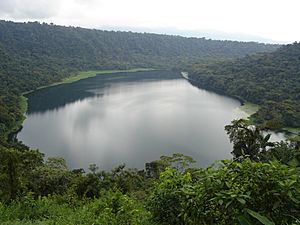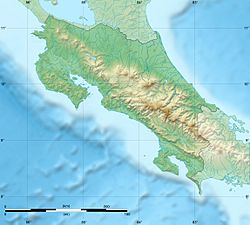Lake Hule facts for kids
Quick facts for kids Lake Hule |
|
|---|---|
 |
|
| Coordinates | 10°17′43″N 84°12′32″W / 10.295278°N 84.208889°W |
| Type | crater lake |
| Max. length | 1 km (0.62 mi) |
| Surface area | 0.547 km2 (0.211 sq mi) |
| Max. depth | 19.8 m (65 ft) |
| Surface elevation | 740 m (2,430 ft) |
Lake Hule (which means Lake of Rubber in Spanish) is a beautiful fresh water lake in Costa Rica. It gets its name because many rubber trees used to grow nearby. This lake is special because it's a crater lake, meaning it formed inside an old volcano.
Lake Hule is found in the northern highlands of Costa Rica. It's part of a group of three lakes, including Lake Congo and Lake Bosque Alegre. All these lakes are protected as part of the Bosque Alegre Wildlife Refuge. This refuge helps protect the amazing plants and animals that live there.
Where is Lake Hule?
Lake Hule is located in a place called Los Ángeles Sur. This area is part of the Río Cuarto canton, which is in the Alajuela province of Costa Rica. It's a bit hidden away, making it a peaceful spot.
What is Lake Hule like?
Lake Hule is a type of maar lake. A maar lake forms when a volcano erupts with a big explosion, creating a wide, shallow crater that later fills with water. Lake Hule has a nearly round shape, like a perfect circle.
Even though it's a volcanic lake, there isn't any active volcanic activity happening there now. The lake gets its water from three small streams. These streams flow down from the northern side of a nearby volcano called Congo Volcano, keeping Lake Hule full of fresh water.
See also
- List of lakes in Costa Rica
 In Spanish: Laguna de Hule para niños
In Spanish: Laguna de Hule para niños
 | Tommie Smith |
 | Simone Manuel |
 | Shani Davis |
 | Simone Biles |
 | Alice Coachman |


